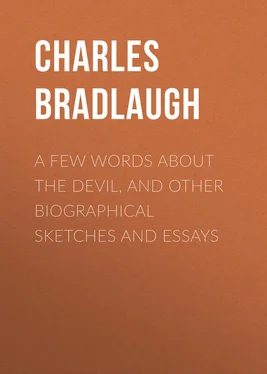Charles Bradlaugh - A Few Words About the Devil, and Other Biographical Sketches and Essays
Здесь есть возможность читать онлайн «Charles Bradlaugh - A Few Words About the Devil, and Other Biographical Sketches and Essays» — ознакомительный отрывок электронной книги совершенно бесплатно, а после прочтения отрывка купить полную версию. В некоторых случаях можно слушать аудио, скачать через торрент в формате fb2 и присутствует краткое содержание. Жанр: foreign_prose, на английском языке. Описание произведения, (предисловие) а так же отзывы посетителей доступны на портале библиотеки ЛибКат.
- Название:A Few Words About the Devil, and Other Biographical Sketches and Essays
- Автор:
- Жанр:
- Год:неизвестен
- ISBN:нет данных
- Рейтинг книги:5 / 5. Голосов: 1
-
Избранное:Добавить в избранное
- Отзывы:
-
Ваша оценка:
- 100
- 1
- 2
- 3
- 4
- 5
A Few Words About the Devil, and Other Biographical Sketches and Essays: краткое содержание, описание и аннотация
Предлагаем к чтению аннотацию, описание, краткое содержание или предисловие (зависит от того, что написал сам автор книги «A Few Words About the Devil, and Other Biographical Sketches and Essays»). Если вы не нашли необходимую информацию о книге — напишите в комментариях, мы постараемся отыскать её.
A Few Words About the Devil, and Other Biographical Sketches and Essays — читать онлайн ознакомительный отрывок
Ниже представлен текст книги, разбитый по страницам. Система сохранения места последней прочитанной страницы, позволяет с удобством читать онлайн бесплатно книгу «A Few Words About the Devil, and Other Biographical Sketches and Essays», без необходимости каждый раз заново искать на чём Вы остановились. Поставьте закладку, и сможете в любой момент перейти на страницу, на которой закончили чтение.
Интервал:
Закладка:
Isaac growing old, and fearing from his physical infirmities the near approach of death, was anxious to bless Esau before he died, and directed him to take quiver and bow and go out in the field to hunt some venison for a savory meat, such as old Isaac loved. Esau departed, but when he had left his father's presence in order to fulfill his request, Jacob appeared on the scene. Instigated by his mother, he, by an abject stratagem, passed himself off as Esau. With a savory meat prepared by Rebekah, he came into his father's presence, and Isaac said, "Who art thou, my son?" Lying lips are an abomination to the Lord. The Lord loved Jacob, yet Jacob lied to his old blind father, saying, "I am Esau, thy first-born." Isaac had some doubts: these are manifested by his inquiring how it was that the game was killed so quickly. Jacob, whom God loved, in a spirit of shameless blasphemy replied, "Because the Lord thy God brought it to me." Isaac still hesitated, fancying that he recognized the voice to be the voice of Jacob, and again questioned him, saying, "Art thou my very son Esau?" God is the God of truth and loved Jacob, yet Jacob said, "I am." Then Isaac blessed Jacob, believing that he was blessing Esau: and God permitted the fraud to be successful, and himself also blessed Jacob. In that extraordinary composition known as the Epistle to the Hebrews, we are told that by faith Isaac blessed Jacob. But what faith had Isaac? Faith that Jacob was Esau? His belief was produced by deceptive appearances. His faith resulted from false representations. And there are very many men in the world who have no better foundation for their religious faith than had Isaac when he blessed Jacob, believing him to be Esau. In the Douay bible I find the following note on this remarkable narrative: "St. Augustine (X. contra mendacium c. 10), treating at large upon this place, excuseth Jacob from a lie, because thi's whole passage was mysterious, as relating to the preference which was afterward to be given to the Gentiles before the carnal Jews, which Jacob, by prophetic light, might understand. So far it is certain that the first birthright, both by divine election and by Esau's free cession, belonged to Jacob; so that if there were any lie in the case, it would be no more than an officious and venial one." How glorious to be a pa triarch, and to have a real saint laboring years after your death to twist your lies into truth by aid of prophetic light. Lying is at all times most disreputable, but at the deathbed the crime is rendered more heinous. The death hour would have awed many men into speaking the truth, but it had little effect on Jacob. Although Isaac was about to die, this greedy knave cared not, so that he got from the dying man the sought-for prize. God is said to love righteousness and hate iniquity, yet he loved the iniquitous Jacob, and hated the honest Esau. All knaves are tinged more or less with cowardice. Jacob was no exception to the rule. His brother enraged at the deception practiced upon Isaac, threatened to kill Jacob. Jacob was warned by his mother and fled. Induced by Rebekah, Isaac charged Jacob to marry one of Laban's daughters. On the way to Haran, where Laban dwell, Jacob rested and slept. While sleeping he dreamed; ordinarily dreams have little significance, but in the bible they are more important. Some of the most weighty and vital facts (?) of the bible are communicated in dreams, and rightly so; if the men had been wide awake, they would have probably rejected the revelation as absurd. So much does that prince of darkness, the devil, influence mankind against the bible in the daytime, that it is when all is dark, and our eyes are closed, and the senses dormant, that God's mysteries are most clearly seen and understood. Jacob "saw in his sleep a ladder standing upon the earth, and the top thereof touching heaven; the angels of God ascending and descending by it, and the Lord leaning upon the ladder ." In the ancient temples of India, and in the mysteries of Mithra, the seven-stepped ladder by which the spirits ascended to heaven is a prominent feature, and one of probably far higher antiquity than the age of Jacob. Did paganism furnish the groundwork for the patriarch's dream? "No man hath seen God at any time." God is "invisible." Yet Jacob saw the invisible God, whom no man hath seen or can see, either standing above a ladder or leaning upon it. True, it was all a dream. Yet God spoke to Jacob; but perhaps that was a delusion too. We find by scripture that God threatens to send to some "strong delusions, that they might believe a lie and be damned." Poor Jacob was much frightened, as any one might be, to dream of God leaning on so long a ladder. What if it had broken and the dreamer underneath it? Jacob's fears were not so powerful but that his shrewdness and avarice had full scope in a sort of half-vow, half-contract, made in the morning. Jacob said, "If God will be with me and will keep me in this way that I go, and will give me bread to eat, and raiment to put on, so that I shall come again to my father's house in peace, then shall the Lord be my God." The inference deducible from this conditional statement is, that if God failed to complete the items enumerated by Jacob, then the latter would have nothing to do with him. Jacob was a shrewd Jew, who would have laughed to scorn the preaching, "Take no thought, saying, what shall we eat? or, what shall we drink? or, wherewithal shall we be clothed?"
After this contract, Jacob went on his journey, and reached the house of his mother's brother, Laban, into whose service he entered. "Diamond cut diamond" would be an appropriate heading to the tale which gives the transactions between Jacob the Jew and Laban the son of Nahor. Laban had two daughters. Rachel, the youngest, was "beautiful and well-favored;" Leah, the elder, was "blear-eyed." Jacob served for the pretty one; but on the wedding-day Laban made a feast, and gave Jacob the ugly Leah instead of the pretty Rachel. Jacob being (according to Josephs) both in drink and in the dark, it was morning ere he discovered his error. After this Jacob served for Rachel also, and then the remainder of the chapter of Jacob's servitude to Laban is but the recital of a series of frauds and trickeries. Jacob embezzled Laban's property, and Laban misappropriated and changed Jacob's wages. In fact, if Jacob had not possessed the advantage of divine aid, he would probably have failed in the endeavor to cheat his master; but God, who says "Thou shalt not covet thy neighbor's house, nor anything that is thy neighbor's," encouraged Jacob in his career of criminality. At last, Jacob, having amassed a large quantity of property, determined to abscond from his employment, and taking advantage of his uncle's absence at sheepshearing, "he stole away unawares," taking with him his wives, his children, flocks, herds, and goods. To crown the whole, Rachel, worthy wife of a husband so fraudulent, stole her father's gods. In the present day the next phase would be the employment of Mr. Sergeant Vericute, of the special detective department, and the issue of bills as follows:
But in those days God's ways were not as our ways. God came to Laban in a dream and compounded the felony, saying, "Take heed thou speak not anything harshly against Jacob." 25 25 Genesis xxxi, 24, Douay version.
This would probably prevent Laban giving evidence in a police court against Jacob, and thus save him from transportation or penal servitude. After a reconciliation and treaty had been effected between Jacob and Laban, the former went on his way "and the angel of God met him." Angels are not included in the circle with which I have at present made acquaintance, and I hesitate, therefore, to comment on the meeting between Jacob and the angels. Balaam's ass, at a later period, shared the good fortune which was the lot of Jacob, for that animal also had a meeting with an angel. Jacob was the grandson of the faithful Abraham to whom angels also appeared. Perhaps angelic apparitions are limited to asses and the faithful. On this point I do not venture to assert, and but timidly suggest. It is somewhat extraordinary that Jacob should have manifested no surprise at meeting a host of angels. Still more worthy of note is it that our good translators elevate the same words into "angels" in verse 1, which they degrade into "messengers" in verse 3. John Bellamy, in his translation, says the "angels were not immortal angels," and it is very probable John Bellamy was right.
Интервал:
Закладка:
Похожие книги на «A Few Words About the Devil, and Other Biographical Sketches and Essays»
Представляем Вашему вниманию похожие книги на «A Few Words About the Devil, and Other Biographical Sketches and Essays» списком для выбора. Мы отобрали схожую по названию и смыслу литературу в надежде предоставить читателям больше вариантов отыскать новые, интересные, ещё непрочитанные произведения.
Обсуждение, отзывы о книге «A Few Words About the Devil, and Other Biographical Sketches and Essays» и просто собственные мнения читателей. Оставьте ваши комментарии, напишите, что Вы думаете о произведении, его смысле или главных героях. Укажите что конкретно понравилось, а что нет, и почему Вы так считаете.












